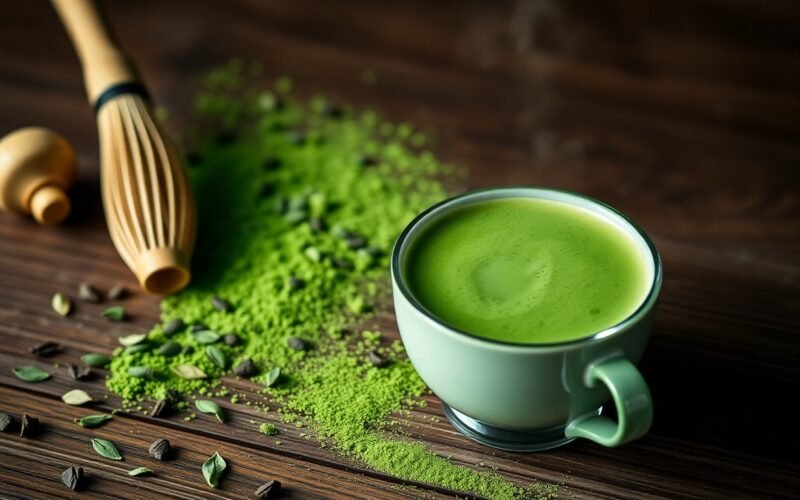Matcha offers a unique blend of flavor and benefits that elevates your tea and coffee experience. By choosing this vibrant green powder, you’re not just drinking tea; you’re indulging in a centuries-old tradition that boasts enhanced energy without the jitters, thanks to its L-theanine content. Additionally, matcha provides antioxidants that support your health and well-being. However, you should also be aware of quality variations on the market, which can impact flavor and effects. Dive into the secrets of matcha to enrich your daily beverage ritual!
Key Takeaways:
- Matcha powder offers a unique blend of flavors that can enhance both traditional tea drinking and coffee beverages, making it a versatile choice for enthusiasts.
- Rich in antioxidants, matcha can provide health benefits such as improved focus and metabolism, appealing to those seeking a natural energy boost.
- Proper preparation is key; whisking matcha with hot water or blending it into drinks ensures a smooth consistency and maximizes its flavor profile.
The Rich Cultural History of Matcha
Delve into matcha’s rich cultural history, which spans centuries and has deep roots in Japanese tradition. Initially introduced in the Tang Dynasty of China, it evolved into a significant part of Japanese ceremonies, symbolizing mindfulness and spirituality. The tea became central to the Coffee Creamer for Matcha? A Secret to Making … – Green Tea culture, where it embodies hospitality and companionship, serving as a bridge between the past and present.
Ancient Origins and Traditional Practices
Matcha’s journey begins with Zen Buddhist monks in the 12th century, who utilized it for enhancing meditation. The meticulous process of cultivating, harvesting, and grinding tea leaves into a fine powder showcases immense skill. Rituals surrounding matcha, such as the renowned Japanese tea ceremony, emphasize discipline, harmony, and respect, making the consumption of matcha an art form that is still practiced today.
Matcha in Modern Japanese Culture
In contemporary Japan, matcha has transformed from a ceremonial beverage to a widespread cultural staple. It’s not just limited to traditional tea ceremonies; you’ll find matcha integrated into desserts, ice creams, and even lattes. The popularity of matcha-inspired cafés and its infusion into daily life mark a shift in how you can enjoy this vibrant green elixir, allowing you to savor its rich flavors anytime or anywhere.
Matcha’s evolution in modern Japanese culture is a testament to its versatility and enduring appeal. Beyond being a beverage, it represents a connection to tradition while simultaneously embracing contemporary tastes. The rise of artisanal matcha shops encourages you to explore premium quality matcha sourced from local producers, enhancing your appreciation for this time-honored drink. You’ll find that each sip tells a story of tradition melded with innovation, inviting you to partake in an experience that transcends generations.
Decoding the Nutritional Powerhouse
Matcha is not just a trendy beverage; its nutritional profile makes it a real powerhouse for health enthusiasts. Packed with vitamins, minerals, and antioxidants, matcha elevates your daily wellness routine. For more insights, check out 7 Matcha Secrets & Tips from a Student of Traditional ….
Comparing Matcha to Traditional Green Tea
| Matcha | Whole leaf ground into a fine powder; therefore, you consume the entire tea leaf. |
| Traditional Green Tea | Infused water; leaves are steeped and removed, resulting in less nutritional absorption. |
The Unique Antioxidant Profile of Matcha
The antioxidant content in matcha, particularly catechins, sets it apart from traditional green tea. One cup of matcha can contain up to 137 times more antioxidants than brewed green tea. This high concentration gives matcha the edge in fighting free radicals and reducing oxidative stress, ultimately supporting your health in various ways. Such potency comes from the specific growing conditions and the fact that you consume the whole leaf, making matcha a superior choice for antioxidant intake.

Brewing Techniques for Optimal Flavor
Your matcha experience largely depends on how you brew it. Start with high-quality matcha powder and use water that’s between 160°F to 175°F for the best flavor extraction. Combine the matcha powder with a little hot water and use a whisk or a frother to create a smooth paste before adding more water. This technique ensures that your matcha doesn’t clump and develops a rich, full-bodied taste with vibrant green color.
The Art of Whisking: Achieving the Perfect Froth
Whisking matcha is an art that can elevate your brew to new heights. Using a bamboo whisk, or chasen, you should whisk vigorously in a zigzag motion rather than a circular one to create a luscious froth. Aim for about 30 seconds of whisking to incorporate air and achieve a light, frothy texture that enhances the flavor and visual appeal of your drink.
Common Mistakes to Avoid During Preparation
Avoiding common mishaps can significantly improve your matcha preparation. One frequent error is using water that’s too hot, which can lead to a bitter taste. Additionally, neglecting to sift your matcha powder before whisking can cause clumps, impacting texture and flavor. Always measure accurately; too much or too little powder can throw off the balance. Ensuring clean utensils is another overlooked detail that can alter the taste.
Focusing on these common mistakes helps refine your matcha-making skills. For instance, using water above 175°F not only damages the delicate matcha but can rob it of its vibrant flavor and nutrients, leading to a bitter drink. Sifting the powder beforehand ensures a silky blend, as clumps can easily trap water and lead to uneven mixing. Moreover, measuring your matcha accurately (typically 1-2 teaspoons per serving) helps maintain the correct flavor profile, while clean equipment prevents any residual flavors from previous preparations, ensuring that each cup of matcha is a delightful experience.
Matcha vs. Coffee: A Flavorful Showdown
Deciding between matcha and coffee isn’t just a matter of caffeine; it involves a rich tapestry of flavors and textures. Matcha offers a creamy, earthy essence infused with umami, while coffee serves up a bold, roasted profile with varied fruity notes depending on the bean. Each beverage has its own charm, resonating differently with your taste buds. Explore more insights on crafting the ideal cup with Matcha 101: 6 Secrets to Making the Perfect Cup, which probes into preparation tips that elevate the experience.
Caffeine Content and Its Effects on the Body
Caffeine levels in matcha and coffee differ significantly, with a typical cup of brewed coffee averaging around 95 mg per 8 oz, while matcha has approximately 70 mg per serving. This difference in concentration means that you may feel the effects of matcha gradually unfolding, providing a steady energy release without the jitters, while coffee tends to deliver a swifter but more intense energy spike followed by a crash.
Flavor Profiles: How They Interact with Personal Preferences
Your personal taste influences how you perceive the flavors of matcha and coffee. Some individuals are drawn to the smooth, grassy notes that matcha offers, while others may prefer the bold, bitter flavors of a well-brewed coffee. Your choice might depend on the time of day or mood; for instance, you might reach for matcha to kickstart a peaceful morning or opt for coffee during a bustling workday.
Understanding these flavor profiles can guide your beverage choice to align with your day-to-day experiences. For example, if you enjoy lighter, more delicate flavors, matcha’s subtle sweetness and creamy texture may appeal to you over coffee’s sharper contrasts. Conversely, if you seek a strong and rich flavor, coffee’s complex notes can satisfy your cravings. Experimenting with both drinks and how they complement your lifestyle may uncover new favorites while also enhancing your enjoyment and appreciation for the distinct qualities each beverage brings to the table.
Creative Ways to Incorporate Matcha in Daily Life
Integrating matcha into your daily routine opens up a world of possibilities beyond your standard cup of green tea. Try adding matcha to your smoothies for a vibrant nutrient boost, or sprinkle it on yogurt for a unique twist. You can even blend matcha with your favorite nut milk to create a refreshing, chilled drink that packs a flavorful punch. For those with a sweet tooth, using matcha in baked goods, like muffins or pancakes, can elevate your breakfast game while providing a delightful green hue.
Beyond the Cup: Culinary Applications
Matcha isn’t just for sipping; it’s a versatile ingredient that can transform your culinary creations. Accentuate sauces or dressings with its earthy flavor, or use matcha in savory dishes, like sushi or risottos, to add a unique touch. You’ll discover that a delicate hint of matcha can brighten up everything from roasted vegetables to pasta, making your dining experience rich and engaging.
Innovative Recipes that Elevate Your Matcha Experience
Embrace your culinary creativity with innovative recipes that showcase matcha’s unique taste. Consider preparing matcha-infused energy balls, which combine oats, nuts, and sweeteners for a nutritious snack on the go. Alternatively, you can whip up a matcha latte cheesecake that merges the creamy texture of cheesecake with the vibrant flavors of matcha. Each recipe enables you to showcase matcha’s versatility while not sacrificing flavor or nutrition.
Opting for matcha in your recipes not only enhances the visual appeal but also boosts health benefits, such as antioxidants and metabolism-boosting properties. For instance, in your energy ball recipe, mix matcha powder with almond butter, honey, and flaxseeds for a snack that not only tastes good but fuels your energy levels throughout the day. On the dessert front, the matcha latte cheesecake blends tart and sweet meticulously, making it a showstopper for any gathering while introducing your guests to the wonders of matcha.
Conclusion
Drawing together the secrets of matcha powder, you now possess valuable insights that can elevate your tea and coffee experience. By understanding its unique processing, health benefits, and versatile uses, you can make informed choices that enhance your daily routine. Incorporating matcha into your beverages not only adds a rich flavor but also a boost of energy without the crash. Embrace the world of matcha, and let it transform the way you enjoy your favorite drinks.
Matcha Powder Secrets Every Tea And Coffee Lover Should Know
Q: What are the health benefits of matcha powder compared to regular green tea?
A: Matcha powder is known for its high concentration of antioxidants, particularly catechins, which are believed to have various health benefits, including improved metabolism and enhanced mental clarity. Unlike regular green tea, where the leaves are steeped and discarded, matcha involves consuming the entire leaf in powdered form, which means you receive a higher dosage of nutrients and chlorophyll. Additionally, matcha provides a slower release of caffeine due to its unique combination of L-theanine, which promotes relaxation while still enhancing alertness, making it a favorite among those seeking a balanced energy boost without the jitters often associated with coffee.
Q: How can I incorporate matcha powder into my daily routine?
A: There are many creative ways to include matcha powder in your daily regimen. One popular method is to make a traditional matcha tea by whisking the powder with hot water until frothy, creating a smooth beverage. If you enjoy smoothies, try adding a teaspoon of matcha to your favorite fruit blend for an energizing nutritional boost. Matcha can also be incorporated into baked goods such as muffins or cookies, giving a unique flavor while enhancing their health profile. For coffee lovers, consider blending matcha into your coffee for a matcha latte, combining the best of both worlds.
Q: What should I look for when buying high-quality matcha powder?
A: When selecting matcha powder, opt for a vibrant green color, which indicates freshness and high-quality tea leaves. Look for labels that specify ‘ceremonial grade’ for the best aesthetic and flavor, suitable for traditional preparation. Additionally, check for organic certification to ensure that the matcha has been grown without the use of pesticides or harmful chemicals. Freshness is key, so pay attention to packaging dates and aim for products that are sealed to preserve their flavor and nutrient integrity. Avoid matcha with a dull green or yellowish hue, as these are often lower quality or expired products.




